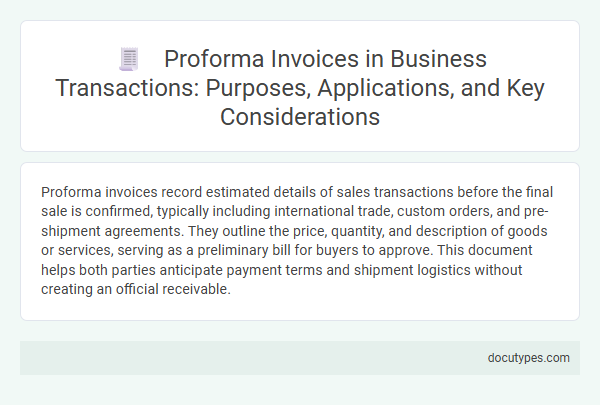Proforma invoices record estimated details of sales transactions before the final sale is confirmed, typically including international trade, custom orders, and pre-shipment agreements. They outline the price, quantity, and description of goods or services, serving as a preliminary bill for buyers to approve. This document helps both parties anticipate payment terms and shipment logistics without creating an official receivable.
Understanding Proforma Invoices: Definition and Overview
A proforma invoice is a preliminary bill of sale sent to buyers before the shipment of goods or services. It outlines the estimated costs and transaction details without serving as a formal demand for payment.
Types of transactions recorded through proforma invoices typically include international trade deals, customized product orders, and service agreements where pricing or delivery terms need confirmation. Your proforma invoice helps clarify the scope, prices, and conditions before finalizing the actual invoice. This document ensures both parties agree on the transaction specifics, reducing the risk of disputes.
Key Purposes of a Proforma Invoice in Business
What types of transactions are recorded through proforma invoices? Proforma invoices primarily capture preliminary sales transactions, including quotes and estimates for goods or services before the final sale. They document potential sales agreements, helping businesses and customers clarify terms and pricing in advance.
What are the key purposes of a proforma invoice in business? Proforma invoices provide an official record of the agreed-upon terms, ensuring transparency and reducing misunderstandings. They support customs clearance, facilitate budgeting, and assist in securing approvals or financing before the actual transaction occurs.
Common Applications of Proforma Invoices
Proforma invoices are primarily used to document preliminary sales agreements and outline transaction terms before the final sale. They serve as a key tool in international trade, providing clarity on costs and specifications for both buyers and sellers.
- Customs Declarations - Proforma invoices detail the value and nature of goods for customs clearance purposes, facilitating the import/export process.
- Quotation and Price Confirmation - They provide a formal price estimate to buyers, helping in budget approval and purchase decisions.
- Advance Payment Requests - Sellers use proforma invoices to request deposits or partial payments before shipment, securing transaction commitment.
Proforma Invoices vs. Commercial Invoices: What’s the Difference?
Proforma invoices are used to record preliminary sales transactions, providing an estimated cost before the final sale is confirmed. They help buyers understand the product details, quantity, and pricing without representing a legally binding agreement. Unlike commercial invoices, which document completed sales for payment and customs purposes, proforma invoices serve as a quotation and negotiation tool.
Essential Elements of a Proforma Invoice
Proforma invoices document preliminary sales transactions before the final sale is confirmed. They provide detailed information about goods or services to be delivered, helping buyers understand terms and costs in advance.
- Product Description - Specifies the type, quality, and quantity of goods or services involved in the transaction.
- Estimated Price - Lists the tentative costs, including unit price, total price, and any applicable taxes or fees.
- Terms and Conditions - Outlines payment terms, delivery timelines, and validity period of the proforma invoice.
Proforma invoices facilitate transparency and agreement on transaction details before final invoicing.
Benefits of Using Proforma Invoices in Transactions
Proforma invoices record preliminary sales transactions, including quotes for goods or services before finalizing the sale. These documents outline estimated costs, shipment details, and payment terms, providing clear expectations between buyers and sellers.
Using proforma invoices enhances transparency, reduces misunderstandings, and facilitates smoother negotiation processes. They help businesses manage cash flow by confirming order details upfront, minimizing risks associated with incorrect or incomplete transactions.
Legal Status and Limitations of Proforma Invoices
Proforma invoices document preliminary sales agreements, primarily used to outline transaction details before the final sale. They do not hold legal status as official tax or payment documents, limiting their use for accounting or customs clearance. Businesses rely on proforma invoices for estimates and customer approval but must issue a formal invoice to complete the legal transaction.
Best Practices for Creating Accurate Proforma Invoices
Proforma invoices primarily record preliminary sales transactions, providing an estimated cost before the final sale is completed. They include details such as product descriptions, quantities, and prices to give buyers a clear understanding of upcoming expenses.
Best practices for creating accurate proforma invoices involve verifying product specifications and pricing to avoid discrepancies. Ensuring clear communication and including all necessary details helps streamline the payment and shipping process.
Proforma Invoices in International Trade
Proforma invoices are preliminary bills of sale sent to buyers in international trade to outline the terms of a sale before the actual shipment occurs. They serve as important documents for customs declarations, import licensing, and buyer approval processes.
- Sales Agreement Preparation - Proforma invoices record agreed-upon prices, quantities, and product specifications before finalizing the sales contract in cross-border transactions.
- Customs Valuation - They provide customs authorities with declared values and shipment details required for import duties and taxes assessment.
- Payment and Financing Arrangements - Used to initiate letters of credit or advance payments by confirming transaction terms between exporter and importer.
What Types of Transactions Are Recorded Through Proforma Invoices? Infographic

